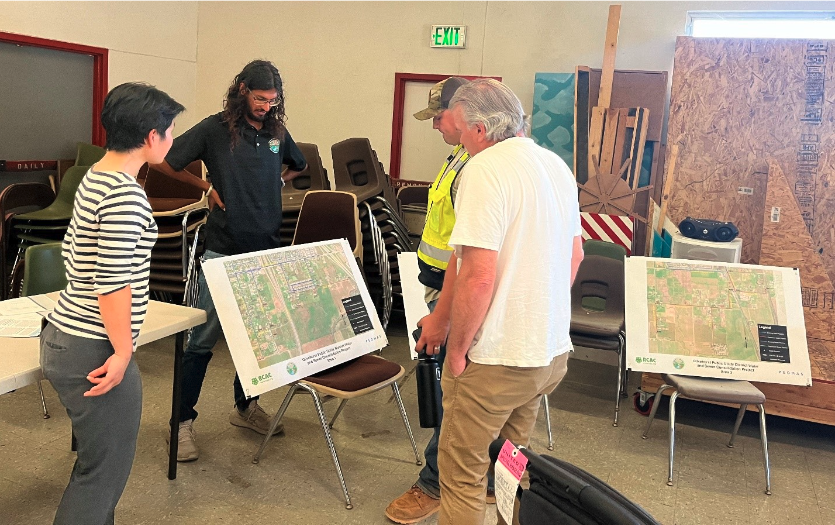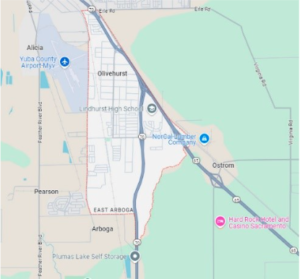Guest Author: Elliott Bochstein, Rural Community Assistance Corporation
For nearly 50 years, the Rural Community Assistance Corporation (RCAC) has been a vital partner in securing reliable water access and sustainable solutions for rural communities across Northern California and 13 western states. RCAC addresses critical needs in both drinking water and wastewater systems, providing technical assistance, training, financial resources, and advocacy for underserved and Indigenous communities. Whether it is providing free comprehensive well assessments and educational resources for private well owners, helping with the rebuilding of Paradise after the destructive Camp Fire, providing resources to communities on drought preparedness, or undertaking septic-to-sewer projects for the Olivehurst Public Utility District (profiled below), RCAC consistently delivers impactful solutions to communities in the Sacramento Valley and beyond.


In the sun-drenched Sacramento Valley, the town of Olivehurst faces a growing challenge. This modest town, home to primarily farmworkers, retirees and commuters, has long relied on private wells and septic systems. But as these aging systems begin to fail, the risk of contamination grows.
Located between Yuba City and the Sacramento River, Olivehurst is surrounded by fields of rice, almonds and walnuts—water-intensive crops that supply domestic and global markets. While agriculture is central to the local economy, it also puts immense strain on the region’s water resources. However, Olivehurst doesn’t suffer from a lack of water. The town has high groundwater levels, but the real problem lies in how this water is managed.
During the rainy season, rising water tables can overwhelm septic systems and leach fields, triggering numerous other complications. These factors, along with decades of agricultural runoff from pesticides and fertilizers seeping into the groundwater, have created complex challenges for the town. While Olivehurst’s groundwater may be abundant, it’s far from safe for all residents.
Leading the charge to address these issues is the Olivehurst Public Utility District, which manages water and wastewater services for the town. Under Public Works Manager Swarnjit Boyal’s direction, OPUD serves 25,000 residents across 7,000 connections. As pressure mounts on the town’s water infrastructure, Boyal and his team are working to ensure that Olivehurst has access to clean, reliable water.
“We have residents just a few streets apart—some connected to public utilities, others still relying on inconsistent wells,” said Swarnjit Boyal. “Our goal is to ensure everyone in our service area can access dependable water.”
Enter SAFER
Through its Safe and Affordable Funding for Equity and Resilience Drinking Water Program, the California Department of Water Resources provided $161,852 to help OPUD begin upgrading its ailing infrastructure. This funding is crucial for the early planning and design stages, but much more will be needed for the full scope of improvements, which includes securing additional grants and completing construction.
At the same time, OPUD is addressing outdated septic systems that exacerbate groundwater contamination. The septic-to-sewer conversion project, supported by the California State Water Resources Control Board, aims to replace these failing systems with modern sewer connections—an essential step in safeguarding public health and the environment.
Altogether, the project will connect roughly 250 homes to Olivehurst’s public water and sewer systems. In addition to addressing the widespread issues caused by high groundwater, the initiative will involve installing new water services, meters, fire hydrants and pipelines, as well as extending sewer mains and laterals for residents who opt into OPUD’s system.
Olivehurst partners with Rural Community Assistance Corporation
Recognizing the complexity of these upgrades, OPUD partnered with Rural Community Assistance Corporation to bring technical expertise and resources to the project. RCAC assists underserved rural and Indigenous communities by helping secure grants, manage infrastructure upgrades, and ensure no resident is left behind.
“Families here rely on private wells that often provide poor-quality water,” said Shannon Townsend-Bettis, the RCAC small utility project manager coordinating the Olivehurst project.
Beyond addressing the community’s infrastructure needs, the project is fundamentally about basic equity. It aims to provide low-income residents with the same water and sanitation services that more affluent communities often take for granted. Moreover, the project unlocks new opportunities for homeowners, boosting property values and allowing them to develop their land in ways previously hindered by stringent well and septic regulations.
Small team, big challenges
For Olivehurst, these upgrades represent a monumental shift. Yet OPUD’s small team is already stretched to its limits. Boyal leads a crew that manages the town’s water and wastewater systems, maintains local parks and oversees two additional water systems serving the nearby community of Plumas Lake. These systems, which serve over 4,300 connections in Olivehurst and 3,700 in Plumas Lake, require extensive treatment to remove naturally occurring contaminants like iron, manganese and hydrogen sulfide. The scope of these responsibilities would challenge a larger team. However, Boyal has leaned on RCAC’s support to help manage the project.
“We’re a small team, but we wear many hats,” Boyal explained. “With help from partners like RCAC, we’ve kept these projects moving forward.”
RCAC has organized the project’s outreach efforts, including public meetings, and created materials to explain the benefits of connecting to the public water system. It also managed grant applications and coordinated environmental reviews with the engineering firm Psomas.
“RCAC has been instrumental in overseeing the project’s progress,” said Boyal. “Their expertise has ensured things run smoothly.”
Alleviating community concerns
At a recent public meeting, residents expressed interest in the project but voiced concerns about potential costs. RCAC collaborated with OPUD to help residents understand the project’s financial structure. With roughly $100,000 in grant funding available per home connection, RCAC emphasized that the more residents who participate, the lower the cost per household would be. This helped ease concerns and reassure families that out-of-pocket expenses would remain manageable for most.
“Most people were curious and wanted to learn more, but they were understandably worried about the financial burden,” Townsend-Bettis said. “That’s typical in a community where many struggle to make ends meet. We just let residents know how important it was to encourage their neighbors to get involved in the project.”
As the project moves forward, RCAC’s role will shift from outreach to supporting new customers as they integrate into OPUD’s system. Once homes are connected to public water and sewer services, RCAC will guide residents through setting up accounts, understanding new billing systems and adjusting to these changes. It’s all part of making the transition as smooth as possible.
Securing water access for the long term
From California farmlands to the Pacific islands, RCAC works hand-in-hand with local leaders, residents and tribal, state and federal governments to strengthen water systems, improve public health and build long-term resilience.
While RCAC’s partnership with Olivehurst is just one of many initiatives across its 13-state region, for this small town, it’s a critical step toward securing a future where clean, reliable water is not a luxury but a right for every resident.
To learn more about RCAC, go to www.rcac.org




